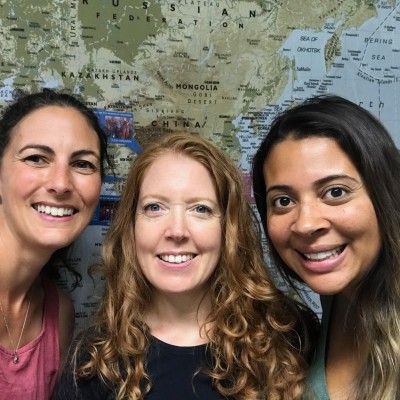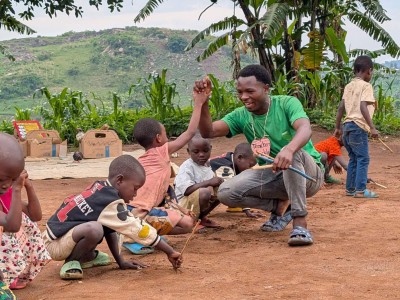Bieneme is a 4-year-old Congolese refugee, living in the Kyaka II settlement in Uganda. He was born with hydrocephalus (a buildup of fluid on the brain) which wasn’t diagnosed until he was 2 years old. As a result of his condition, Bieneme regularly loses consciousness, cannot walk without support, and he has difficulties learning, which has left him very isolated.
His physical condition has resulted in surgery, and is being treated on a regular basis by a local hospital, but socially, instead of receiving extra care, Bieneme had become ostracised by people of all ages in his community, and he rarely had the chance to play with other children.
This social isolation has exacerbated the delay in his speech abilities, and he was becoming easily upset or angry when others interacted with him.
Bieneme was unable to access any education or early years support until one of our cluster groups was formed a few steps from his home. These are small outdoor classes for children aged 3-6 who benefit from the expertise of locally trained caregivers, who create fun, colourful activities, with plenty of focus on play. These cluster classes offer high quality early years education for thousands of the youngest refugee children in the settlement.
Bieneme started attending his local class, which he could walk to from his home. He was given extra time and support from his caregivers (teachers) during learning activities and ‘free choice play’, and his caregivers have developed bespoke learning materials that work well for his learning style and abilities.
Since joining the group, Bieneme’s motor skills, along with his social and emotional development has come on in leaps and bounds. He has learned to control his anger through special attention and guidance from his caregiver and the local teacher trainer in his area.
He now ‘feels loved by the other children who play with him and help him to walk when he gets stuck’.
Biememe can now say his name and the name of his friends, as well as speak in short sentences, including phrases like ‘thank you’ and ‘I am sorry’. He can count from 1-5 and is now mastering 6-10.
His dad has also become a caregiver at a neighbouring cluster group and developed his own business thanks to our local microloan scheme.
Both his mum, dad and older sister are so happy to see Bieneme now learning with friends and taking part in the cluster lessons and his sisters enjoy helping Bieneme get to his classes.






